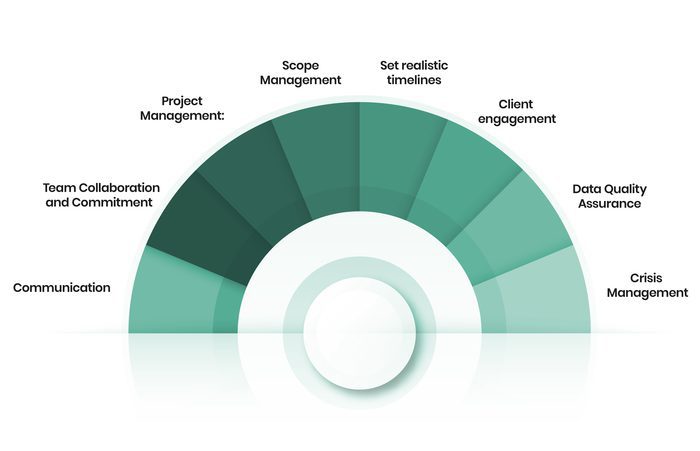Generally, successfully delivering a project is subject to a combination of factors, including but not limited to proper scoping (clearly defined timelines), stakeholder management, and project management. More importantly, the successful delivery of any project is hugely dependent on an efficient project team. As cliché as it may always sound, teamwork does make the dream work.
The COVID-19 pandemic brought many downsides globally, including an economic meltdown and an increase in unemployment. However, we cannot deny the upside to the pandemic, which was our ability to adapt to remote working, which has become a global trend in the grand scheme of things. The pandemic forced many companies to embrace remote working in Nigeria and created a ‘false new normal’. False because many of these companies have now relapsed to the regular 9-5. Even though remote work is the future of work, banks, insurance, oil & gas companies, fintech’s, FMCGs have quickly gone from a hybrid work model during the peak period of the COVID-19 pandemic back to the traditional pre-pandemic work mode.
Reports have indicated that employees can also be very productive working remotely, and the recent pandemic indirectly reinforced this. This new way of working has been the case for pcl. and many other visionary firms in Nigeria, who have proven this theory right by running a full-time remote work policy and still getting the job done to and, in some cases, above expectations. The COVID-19 pandemic has undoubtedly changed the way we work and whether we like it or not, work as we know it today has evolved and will continue to evolve from the traditional methods. We learnt some key lessons during the lockdown in terms of client project delivery, and here are the eight (8) tips we gained from successfully delivering our client projects remotely:
- Communication: Communication is central to the successful delivery of any project, and there should be a constant flow from top to bottom and vice versa. Establish a process to bridge any communication gap in a project team. All team members involved in the project implementation should be fully and equally carried along with the client’s expectations. Likewise, all team members must be proactive regarding the expectations of Terms of Reference (ToR).
- Team Collaboration and Commitment: This is crucial to the successful delivery of projects when working remotely. The dependency on virtual and online tools requires team discipline to initiate and conclude projects in the new norm of remote working. Commitment and time management to assigned tasks and collaboration among teammates is extremely necessary.
- Project Management: Effective project management is critical to remote working. Due to team members working from different locations and being faced with their own local/area infrastructure challenges, it is imperative that the Project Manager deploys an extra layer of hands-on daily and tactical management to help manage the team to the same drum beat or direction.
- Scope Management: It is very important to ensure scope management is at the forefront of every team member during remote working. The project Terms of Reference (ToR) should be prevalent and consulted at regular checkpoints throughout the stages of the project lifecycle. A key lesson is to draw up a mapping table of the ToR to ensure the deliverables are being met. Scope management also helps to arrest any potential scope creep. It is also essential to have a rigorous change control process to manage any impact on the scope.
- Set Realistic Timelines: Managing stakeholder expectations in terms of timelines for deliverables is very important in a virtual work arrangement. This is due to the added complexity of the infrastructure and network challenges which is beyond any contingency plans. While it is necessary to make work estimations during project bids, it is risky to underestimate the effort required considering external factors. Although COVID-19 triggered the recent remote working, the added complexities around movement restrictions, especially for a data collection activity, require diligent timeline estimations with an excellent buffer to manage client expectations.
- Client Engagement: It is more important to have a robust client engagement and communications plan during remote working. Regular communications with the client manage expectations and eliminate assumptions. The key lesson is carrying the client along with frequent updates during project delivery. This engagement allows the client to be effectively part of the journey. This also helps with client relationship management for future project work or opportunities.
- Data Quality Assurance: A rigorous process for Quality Assurance is very significant for remote working. This is even critical when the project involves a lot of data processing, and the team is working remotely from their homes. The take-away lesson is to have a dedicated team member responsible for effective Quality Assurance and have the mandate to challenge and ask team members the difficult questions around the integrity of their data, work, or deliverable contribution.
- Crisis Management: Projects inherently go through different phases during execution, and going through a crisis period is not an anomaly or unusual. However, the approach taken to manage and control crisis is critical to the successful outcome. The key lesson is to make sure all team members and stakeholders are aware of the escalation route and protocols to expedite any crisis. This must be rigorously followed without fear or favour.
Written by:
Henrietta Ifyede
Senior Analyst

